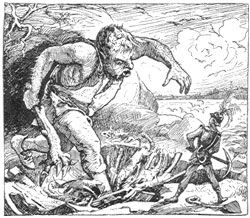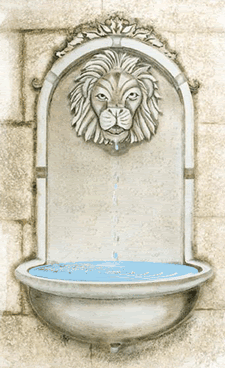Only Giants Will Do
 Jack the Giant-Killer is not, in essence, simply the story of a clever hero surmounting danger. It is in essence the story of such a hero surmounting danger from giants. It is quite easy to contrive a story in which, though the enemies are of normal size, the odds against Jack are equally great. But it will be quite a different story. The whole quality of the imaginative response is determined by the fact that the enemies are giants. That heaviness, that monstrosity, that uncouthness, hangs over the whole thing. Turn it into music and you will feel the difference at once. If your villain is a giant your orchestra will proclaim his entrance in one way: if he is any other kind of villain, in another. I have seen landscapes (notably in the Mourne Mountains) which, under a particular light, made me feel that at any moment a giant might raise his head over the next ridge. Nature has that in her which compels us to invent giants: and only giants will do. (Notice that Gawain was in the north-west corner of England when 'etins aneleden him', giants came blowing after him on the high fells. Can it be an accident that Wordsworth was in the same places when he heard 'low breathings coming after him'?) The dangerousness of the giants is, though important, secondary. In some folk-tales we meet giants who are not dangerous. But they still affect us in much the same way. A good giant is legitimate: but he would be twenty tons of living, earth-shaking oxymoron. The intolerable pressure, the sense of something older, wilder, and more earthy than humanity, would still cleave to him.
Jack the Giant-Killer is not, in essence, simply the story of a clever hero surmounting danger. It is in essence the story of such a hero surmounting danger from giants. It is quite easy to contrive a story in which, though the enemies are of normal size, the odds against Jack are equally great. But it will be quite a different story. The whole quality of the imaginative response is determined by the fact that the enemies are giants. That heaviness, that monstrosity, that uncouthness, hangs over the whole thing. Turn it into music and you will feel the difference at once. If your villain is a giant your orchestra will proclaim his entrance in one way: if he is any other kind of villain, in another. I have seen landscapes (notably in the Mourne Mountains) which, under a particular light, made me feel that at any moment a giant might raise his head over the next ridge. Nature has that in her which compels us to invent giants: and only giants will do. (Notice that Gawain was in the north-west corner of England when 'etins aneleden him', giants came blowing after him on the high fells. Can it be an accident that Wordsworth was in the same places when he heard 'low breathings coming after him'?) The dangerousness of the giants is, though important, secondary. In some folk-tales we meet giants who are not dangerous. But they still affect us in much the same way. A good giant is legitimate: but he would be twenty tons of living, earth-shaking oxymoron. The intolerable pressure, the sense of something older, wilder, and more earthy than humanity, would still cleave to him.~C.S. Lewis, Of Other Worlds, "On Stories" (1st pub. 1947)
_________________________
On this day:
1948 C.S. Lewis's poem "Vitrea Circe" was published in Punch. The poem retells one of the incidents in Homer's Odyssey. (I promise to post this poem tomorrow...'Revie)




4 Comment(s):
Hmmm...'etins' = ents? Anyone? ....Anyone?
I'll bite. And don't forget, there are Ettinsmoors in both Narnia and Middle-Earth. (Well, in ME it's "Ettenmoors".)
Definitely.
From Letter 163:
"They owe their name to the eald enta geweorc of Anglo-Saxon."
Eald enta geweorc means "The old work of giants", and is found in an A-S poem called "The Wanderer".
Kimi, you rock!
Post a Comment
<< Home